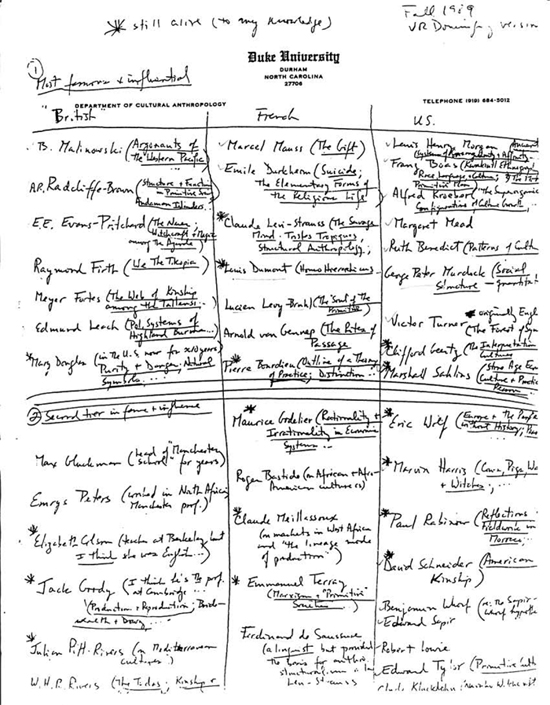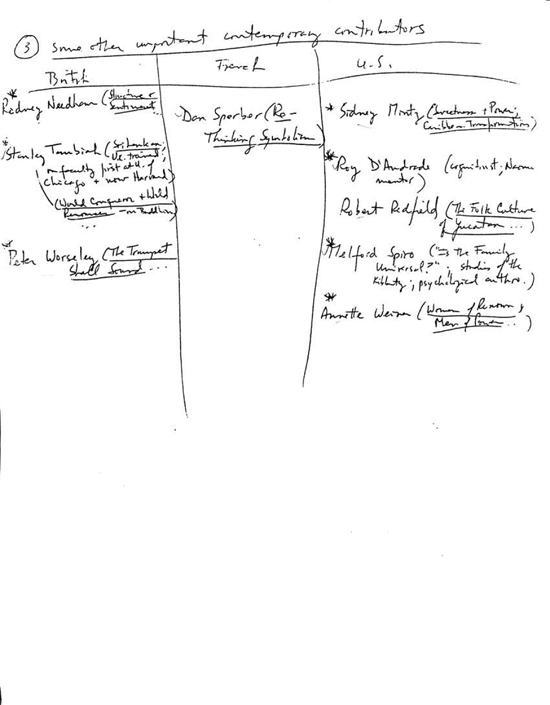There seems to be a bit of penchant on Savage Minds for discussing the desire-as-lack that constitutes anthropology as a discipline, which manifests itself in the frequent gnashing of “intro to” syllabi and proposing of essential works. Far be it from me to avoid joining in the fun. In the irony-laden spirit of Found Magazine, my contribution to this comes not from my own vast and enviable experience, but from a not-so-silent partner, Thomas Chivens. Thom and I were undergrads at UCSC when Virginia Dominguez (current editor of American Ethnologist) taught there. For serendipitous and mysterious reasons that cannot be elaborated in the Internets (for reasons of space), Thom recently unearthed this gem of a handout. 

What I love almost as much as this hand-scrawled clearly definitive (c. 1989, not clear exactly on the provenance of the Duke letterhead) list of must-read anthropologists, is what Thom has to say about it:
looking at it again this morning i can imagine virginia would have revised it over the years (i recall her passing it out amidst a barrage of caveats on its casually-thrown-together nature for her student heading to graduate school). i can see it moving into some sort of spreadsheet type format, endlessly expanding, etc.. but it’s the sense of completeness arising from apparent spontaneity that gives it a magical aura and suggests contesting or revising it is the wrong way to think about it. hopefully widespread reproduction won’t take that away. in this regard, it carries with it something of what giddens talks about as the formulaic truth of guardians, in contrast to the propositional knowledge of experts. and if we need guardians these days, which anthropology could use, i think virginia’s about as good as they come.
Something about the contrast this handout poses to the technological smorgasbord of information and research tools at our disposal captivates me. Part of it is, as Thom points out, the clear need for certain kind of guardian–not just in anthropology, but in any domain where apprenticeship is an essential component of progress in knowledge. Sometimes it’s better to have a hand-scratched, seat-of-the-pants expression of deep knowledge over a real-time, social software, scale-free, really simple, ajax-enhanced, web 2.0 instant access to scholarship. If you know what I mean. Part of it is the “*Still alive, as far as I know” note, which is useful for the earnest anthropological grad student seeking out mentors and influences. Part of it is the emphatic national, tiered grid–I wish I had the guts, and the knowledge to organize my stories of scholarship with such gusto. In any case, I though our readers might enjoy a little bit of the old school, both in form and in content….
Natukashiiiiiiiii….. (That’s Japanese for “I feel so incredibly nostalgic.”) Odd, though, that she has Vic Turner in the American column, since he he always presented himself as a member of the Manchester School.
You know, Chris, I had Dominguez at UCSC — how is it we’ve been co-Savages for nearly a year and I never knew this about you?
Maybe I’ll post one of Loki Pandey’s handouts, which he mimeographed from Murdoch, from Murdoch’s course on the history of anthropological theory. Each week has the three important theorists of the period being discussed; the last week, Murdoch listed… Murdoch.
Ah, desire-as-lack…
Here’s a funny thing — after I posted this, I got to thinking “Dominguez, Dominguez… waitaminit, that don’t sound right”. And it wasn’t — somehow in the years since UCSC (which is not known for the use of mind-altering substances among its students) I’d become convinced that Virginia Dominguez had been one of my profs, because I have two other profs whose names ended in “-ez”. SO I totally lied, and my entire comment above is rendered moot, and thus this comment inreference to that moot comment is also rendered moot.
Moot!
George Stocking is want to pass out a single page xerox to his History of Anthropology course entitled “The Contents of My Mind, 1984” or somesuch which was a sort of Venn diagram of the history of anthropology such as he was able to conceptualize it. I think I have a copy of it somewhere but I don’t think he’d appreciate it if I published it.
By the way, you’ve managed to anticipate my upcoming series of SM posts entitled “great diagrams in qualitative social science.” Strathernograms, anyone?
“There seems to be a bit of penchant on Savage Minds for discussing the desire-as-lack that constitutes anthropology as a discipline”
Huh? am I the only one who found this line pretty bafflingly opaque?
I find all kinds of categories in this blog, but “mexican americans” or “american mexicans” seem to be a white spot on the local map, Mr.Wax.
Yes, what is this “desire-as-lack” that you refer to?
Also, I’m having trouble decoding some of your 2nd and 3rd tier names. Any chance you could transcribe this into ASCII?
–beo
I”m a little confused by your comment, Orange. I suppose I’m being called out for confusing two “-ez” names with another, becuase brown people “all look alike” in my worldview? Dominguez was at UCSC when I appled, leaving jsut as I got there. In the decade since, I’ve read more about her nad of her work than of *any* of my UCSC profs; in fact, I’ve read more of UCSC profs I didn’t take than of those I did. But I’m also a confusoid — for instance, I think the first line of Lake Isle of Innisfree is “I shall arise and go now/ to the lake isle of Innisfree”, when of course a quick google shows definitively that it’s “I will arise and go now, and go to Innisfree.” I suppose Irish poets are also a white space on my racial map…
(PS My version’s better — suck on that, Yeats!)
these comments are weird. Don’t make me think twice about posting this stuff here. And no, I will not transcribe it into ASCII. Perhaps I need to trot out some Lacanian diagrams for the troubled minds? Desire is lack? Anyone, anyone? Just try to enjoy it, like in Found Magazine.
Ckelty:
Despite the tone of modest irony in your original post, I had assumed that you thought there was some intrinsic intellectual value to your notes that you wanted to share with us. But, if your notes are just the intellectual equivalent of a tissue left over from a masturbatory session, then let us discard it and say nothing more.
cheers,
–Beo
Beo — I think the idea was that one of the wonderful things about this little bit of imponderabilia was un-digital non-“real-time, social software, scale-free, really simple, ajax-enhanced, web 2.0 instant access” form. I agree.
Also: that was _really_ growss. EWWWW.
I don’t find this to be a very appropriate tone, but what really got me was the assumption that a site about anthropology would be an imappropriate place to display and discuss a cultural artifact.
Mr. Confusor, Sir, I am not the one to call you out.
Your comment simply triggered the expression of something I keep wondering about for a couple of weeks now, thats all.
This thread is looking a bit more like “Savage Minds meets TGR Forums” (where I learned the internet acronym JONG).
As for the list, it’s kind of fascinating: Bateson is American by Marriage to Mead, or because we paid mor attention to him (or becaue dolphins are the wrong sort of flaky for a pom?) I never knew Mary Douglas was in America. Mead is the only “major figure” w/o a work next to her name. But even more interesting thatn the possible quibbles is my basic response which is “Yeah, that works.”
Oh, and ckelty: I think what some of us were wondering about was not so much the meaning of “desire as lack,” but the claim that this constituted anthropology as a discipline. Myself, I’m kinda inclined to think of anthropology not as constituted by some sort of essence, but as a historical individual, constituted over time by people who understood themselves to be anthropologists, and maybe some other people they read–in a way that is nicely captured byt the cultural artifact above. But maybe I see it that way because I’m “basically Boasian but in a Weberian kind of way.”
Yes, my comment was EWWW. I purposely transgressed contemporary social taboos, to make a point. I found Ckelty’s response — to what I thought were legitimate questions — to be offhandedly rude. If Ckelty doesn’t take his/her own intellectual discipline seriously, well, how can I take Ckelty seriously?
Oneman makes a good point that this posted document can be regarded as a cultural artifact. If so, then what is the social and intellectual context of this artifact? These are legitimate questions — ones that Ckelty seems reluctant to address.
I would suspect that Ckelty actually values his/her document in some way, and that for some reason he/she is reluctant to express this (I would argue that all cultural artifacts are valued either by their creator or their owner). Since Ckelty claims to want us to only take his document at face value (i.e. apply no intrinsic value to it), I can only surmise that discussing it would somehow threaten his/her postmodern sense of irony and intellectual detachment. I think that even Lacan would agree, that distancing ourselves from the cultural objects that we create, is an act of self-exclusion — in this case from a cultural matrix that Ckelty obviously doesn’t approve of (be it only a belief system that iconizes Intro Anthro texts).
As for Found Magazine, well, contemporary culture can be regarded as a vast potlatch of images and memes — all spewed out at rate that overloads our ability to absorb, categorize or analyze them. I spend my time trying to filter out this spew, so I can focus on what is important for me to function successfully in this society. I made the mistake of attaching some significance (value) to Ckelty’s document. My apologies. It won’t happen again.
But if you don’t want to be bothered with questions that you don’t want to answer, don’t post.
Or maybe I just need a cookie and a nap 😉
–Beo
I still would like to know how desire-as-lack constitutes anthropology as a discipline? I’m honestly not trying to be a crank — I seriously, really, have no idea what that statement means.
Oh, Lacan. Of course, why didn’t you say so? How silly of us. An evil psychol-y-iatrist who we have been trained to ignore. All that psych stuff leads directly to Dolphins. Anthro is empirical and as such needs lie-detectors, not pills, therapy and befuddle about the Other/Phallus.
Anyway, hmm: Desire to erase the distinction between self and other, which is impossible, a Lack. But you know for Lacan, the Other was not a thing, or love or recognition, but the center of the system, symbolic order or language itself. And this is where we desire to be. At which point we are all quite right to go Huh? How does this relate to Anthropology again? And how is endlessly working over Anthro’s biblio-history a manifestation of that? If it is then doesn’t ‘desire-as-lack’ only constitute this blog (which more and more is a blog about Anthropology, rather than an Anthropology blog) but not the Discipline? Look, they want you to believe this stuff, but it is bad for you. Just go out and do some research. I have.
The national relabelling _is_ telling — this is from a time when Turner was the ‘symbolic anthropologist’ not the ‘schism and continuity’ person and everyone knew him as a prof in Social Thought at Chicago, not a Mancusian. How Edward Tylor got to be American is a bit beyond me, though. 1989 has also got to be one of the last years before Melford Spiro and Robert Redfield were replaced with George Marcus and Jim Clifford.